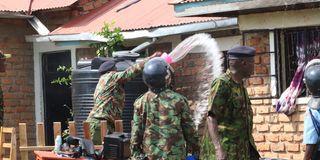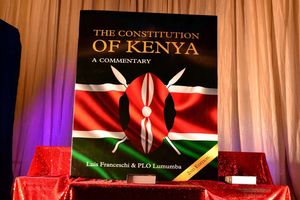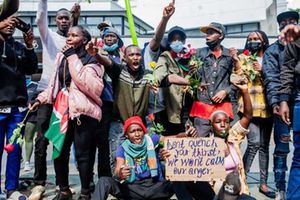
Officers put out the fire at Mawego Police Station in Homa Bay County on July 3, 2025. The police station was vandalised and set on fire by youth protesting against Albert Ojwang's murder.
The State thought the story of Albert Ojwang’s murder in police custody would end quietly, that Kenyans would just move on — that our attention would shift to the next crisis, the next body and the next tragedy in this endless loop of state brutality.
They thought they could write off his death with one official statement, throw a few lines into a press release, call it a suicide, and get away with it like they always do. But this wasn’t 2005, it wasn’t even 2023. And Albert wasn’t the kind of spirit you could silence with a lie. From the very moment the police claimed that Albert had taken his own life inside a police station, the ground beneath that lie began to crack.
Albert Ojwang’s name didn’t fade. It refused to be buried. It clawed its way into our timelines, our protests, our collective conscience, and it stayed there. His death, at Nairobi’s Central Police Station in June, didn’t feel like just another statistic, it felt like a final, unbearable insult.
The rage it sparked was not just about Albert. It was about everything that has come before him, about the violence and humiliation and impunity that has defined the relationship between the police and the public for decades. His death was not an isolated tragedy. It was a match tossed into a forest of dry pain.
When the postmortem results finally came out, the lie was shattered. Albert had not committed suicide as the police had claimed. He had been assaulted, violently and repeatedly. The damage was visible. The bruises, the internal bleeding, the injuries on his body spoke louder than any press conference. His death had not been a mistake or an unfortunate incident. It had been a murder. The institution that killed him had tried to lie about it with the kind of ease that only comes from doing it too many times before.
Final blow
But even that wasn’t the final blow. What broke whatever was left of the public’s ability to stomach this injustice was the CCTV footage that emerged from Mbagathi Hospital, where the police claimed they had “rushed” Albert for medical attention.
The word “rushed” was their desperate attempt to frame themselves as concerned, as reactive, as maybe even a little remorseful. But the footage showed something entirely different. It showed officers moving around like they were on a lunch break. Phones to their ears. No panic. No effort. Albert’s body was there, lifeless, handled with the same casualness one would give a misplaced bag. No medical attention, no stretchers, no nurses — just dead weight and silence.
That video wasn’t just evidence, it was spiritual violence. It made people sick to watch because it confirmed what many had feared — that our lives meant absolutely nothing to the police. That even in death, even in the final moments of a life brutally cut short, there would be no dignity. No urgency. No humanity.

Mourners carry Albert Ojwang'a coffin in a funeral procession in Homa Bay County on July 3, 2025.
By then, Albert’s name was on everyone’s lips. But it didn’t stop there. A month after his death, when the State thought emotions had cooled down, when they hoped we would forget and find new distractions, something remarkable happened. His body was taken home to Homa Bay, but not quietly. It was carried by hundreds of young people who had organised, mourned, mobilised and decided that this death would not be another forgotten story. They marched with his coffin all the way to Mawego Police Station, where Albert was first booked before being transferred to Nairobi.
They laid Albert’s coffin at the gates of that station like a final offering. It was like a curse; a demand. It wasn’t just a funeral, it was a confrontation. It was grief turned into fury. It was thousands of people saying, “We know what you did. We saw the lie. We’ll not let you sleep.”
That act broke something open. Part of Mawego Police Station would later go up in flames, just like several others that have been torched since June 25. These aren’t mindless acts of vandalism, they are responses to being unheard. They are the language of people who have begged for justice and received bullets, who have followed legal channels and ended up at mass graves, who have filed reports only to see their loved ones killed by the very officers they complained about.
Albert’s death revealed what many in power refuse to admit: that the social contract between the police and the people has been violently severed. There is no trust and no belief in reform. The Kenyan police, to many young people, are not law enforcers. They behave like a gang or a cartel. They are a threat.
You can see it in the way the public reacts to police content online. Officers film themselves dancing on TikTok, trying to re-brand the force with charm and humour, but the comment sections are brutal. There is no warmth or respect, just venom with comments such as, “You killed Albert; we don’t dance with murderers; you will answer for every bullet. “The disconnect is vast, and no social media campaign can bridge that gap.
The government doesn’t help. Cabinet Secretaries go on television and endorse extrajudicial killings without flinching. Interior Cabinet Secretary Kipchumba Murkomen publicly gave a shoot-to-kill order like he was talking about traffic rules. But even that didn’t instill fear because what they don’t realise is that fear is not what defines this generation anymore. What defines us now is memory — memory and rage.
Distant military unit
The police are not some distant military unit. They are our neighbours, our relatives, our childhood friends and so on. And that closeness no longer protects them, it implicates them. They are now being seen as symbols of everything wrong, everything violent, everything broken about this state. And the fire is no longer in the streets alone, it’s in our hearts, in our art, in our refusal to let any name fade quietly into the shadows.

Mourners at Albert Ojwang's funeral procession in Homa Bay County on July 3, 2025.
Albert did not die quietly, he did not get the dignity he deserved. But in death, he became more than a victim. He became a witness, a ghost that follows the State wherever it goes. A reminder that we are watching; that we are remembering; that we will carry every name until the system that killed him finally collapses under the weight of its lies. He is in our protests, in our voices, in our grief. And until there is justice — real, unshakeable justice — Albert will not rest. And neither will we.
The Kenya Police Service is not a broken institution in need of repair, it is a deeply compromised force that has long lost its legitimacy. What we need is not reform but a complete overhaul. It cannot stop with the police.
The entire criminal justice system is rotten to the core— from the Judiciary to the prosecution to the Executive that enables impunity from the top. Any attempt to fix the police in isolation is cosmetic. The entire system must be dismantled and rebuilt — not patched up, not rebranded but fundamentally transformed.









